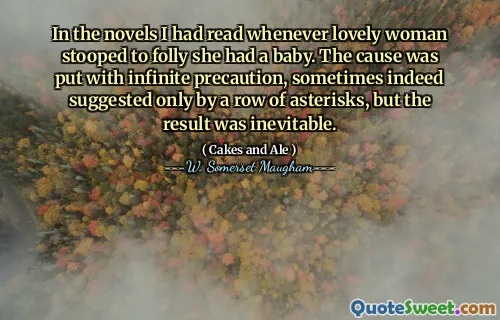is a novel by W. Somerset Maugham that explores themes of artistic integrity, social hypocrisy, and human relationships through the lens of an author's reflections on his life and those around him. The story is narrated by a writer named William Ashenden, who reminisces about his acquaintance with the famous novelist Edward Driffield and his experiences in the literary world. Driffield's unconventional life, especially his marriage to the beautiful but uneducated Rosie, captivates Ashenden and serves as a focal point for the narrative. The novel delves into the contrasting values of the struggling literary community and the established norms of society. As Ashenden recounts Driffield's rise to fame, he also reveals the prejudices faced by those who deviate from societal expectations. Through this lens, Maugham critiques the pretentiousness of literary circles and the moral judgments often placed on individuals who embrace life differently. Ultimately, is a rich exploration of the pursuit of authenticity and the complexities of human connection. Maugham's characters illustrate the tensions between artistic authenticity and public perception, showcasing the often unrecognized depth of individual experiences and relationships. The novel remains a poignant reflection on the nature of creativity and the societal constraints that can stifle it.
More »
Today Birthdays
1729 -
Edmund Burke
1949 -
Haruki Murakami
1954 -
Howard Stern
1876 -
Jack London
1993 -
Zayn Malik
1951 -
Kirstie Alley
1863 -
Swami Vivekananda
1923 -
Alice Miller
1987 -
Naya Rivera
1825 -
Brooke Foss Westcott
1944 -
Joe Frazier
1951 -
Rush Limbaugh
1964 -
Jeff Bezos
1978 -
Jeremy Camp
1628 -
Charles Perrault
1856 -
John Singer Sargent
1970 -
Kaja Foglio
1953 -
Rick Santelli
1986 -
Gemma Arterton
1968 -
Raf Simons
1958 -
Christiane Amanpour
1966 -
Olivier Martinez
1996 -
Ella Henderson
1917 -
Maharishi Mahesh Yogi
1949 -
Ottmar Hitzfeld
1928 -
Ruth Brown
1968 -
Heather Mills
1946 -
George Duke
1968 -
Rachael Harris
1923 -
Ira Hayes

